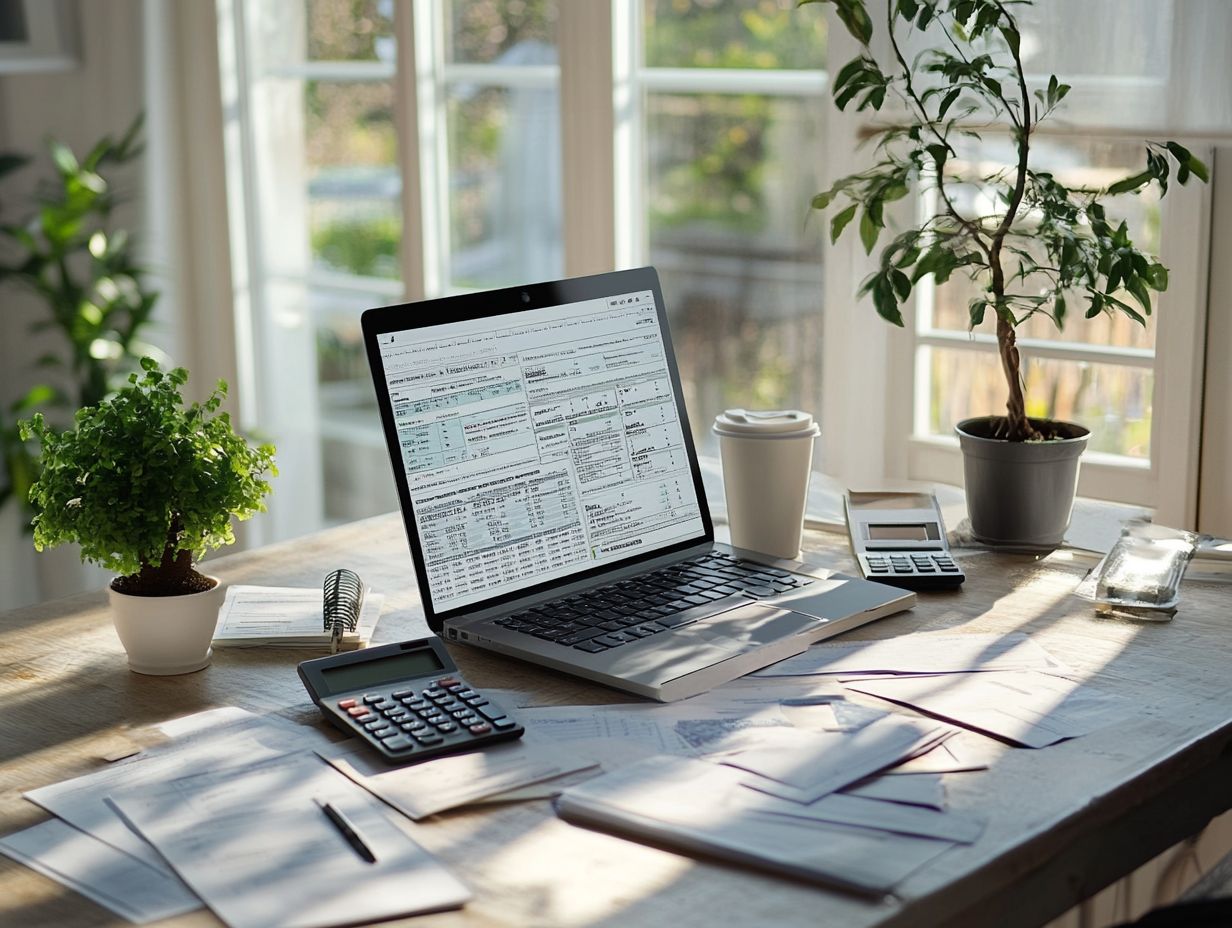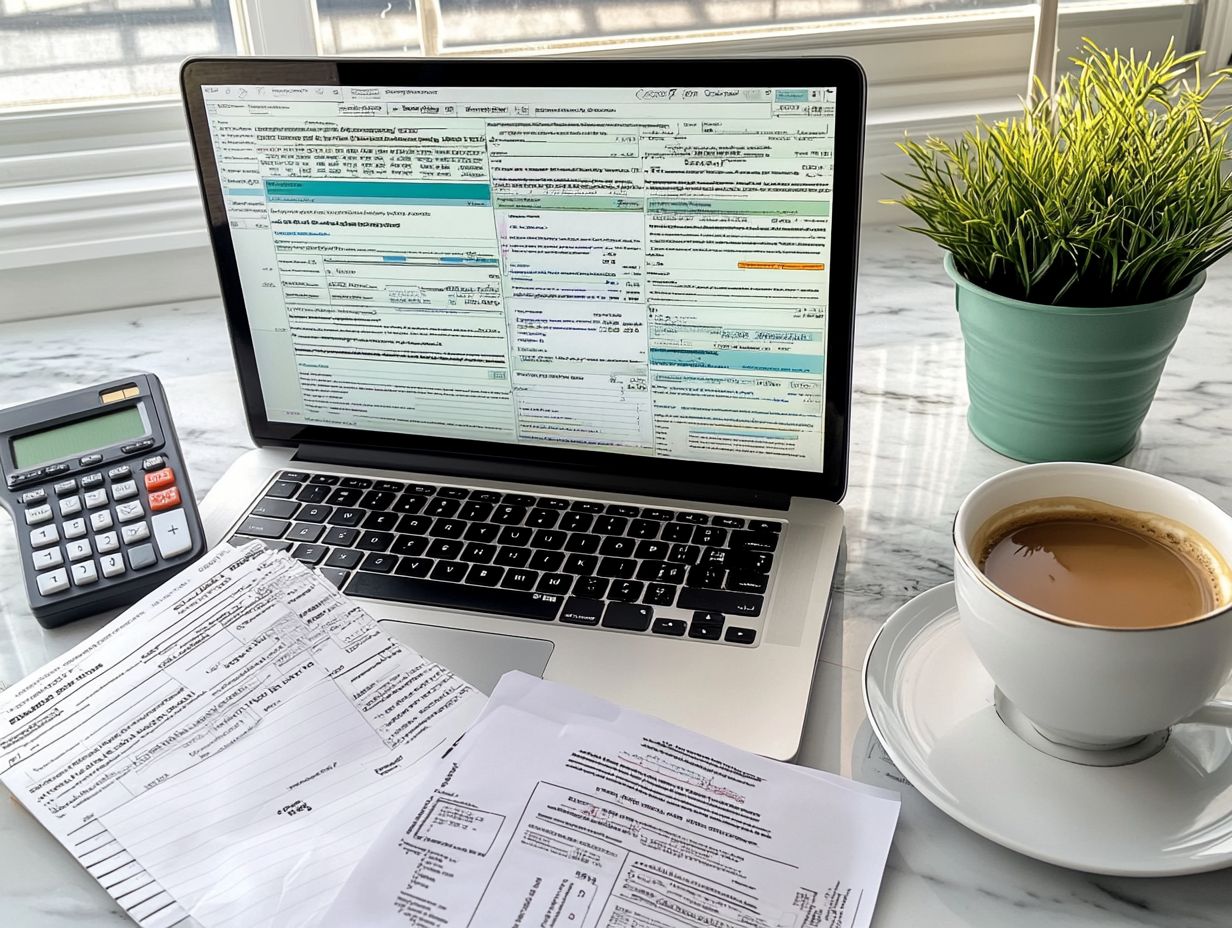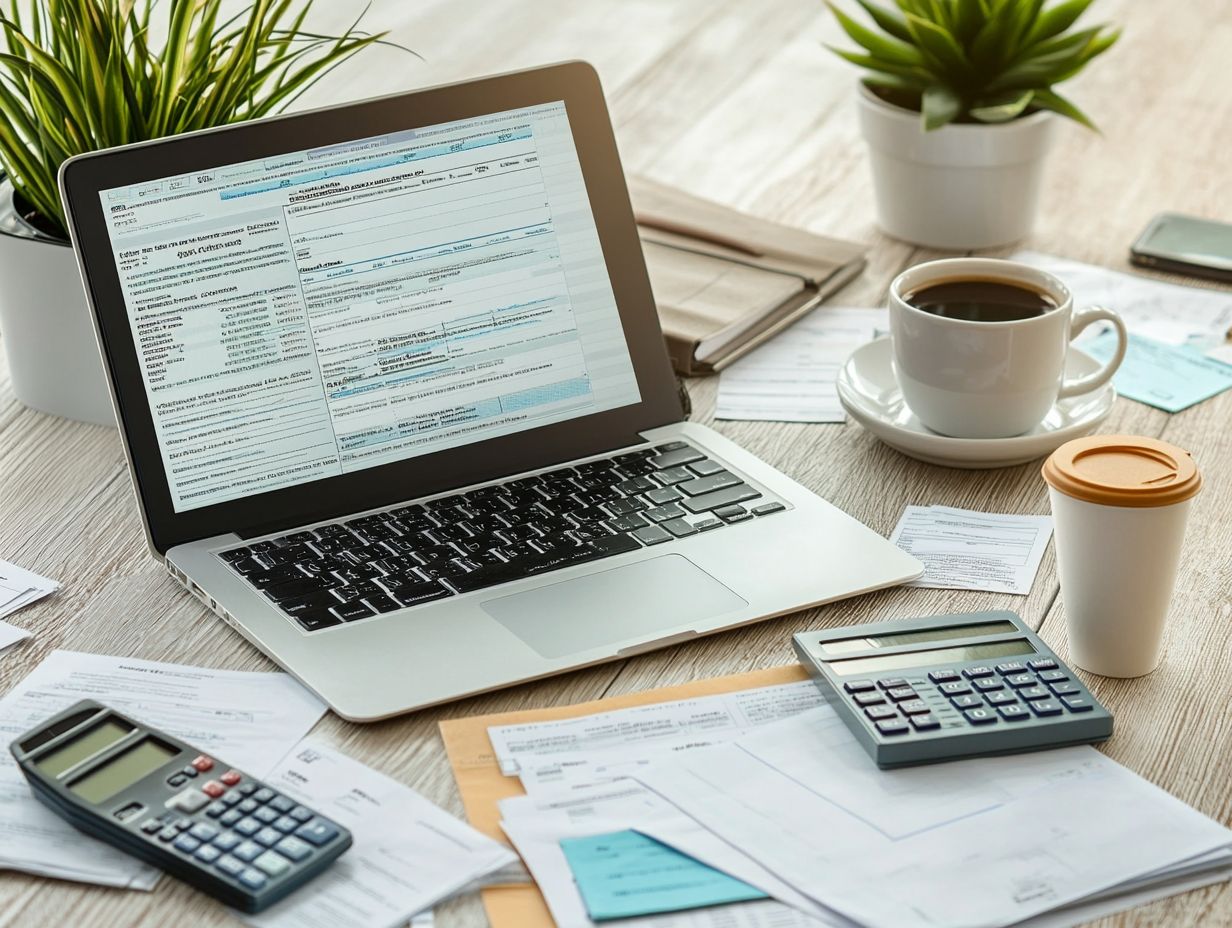5 Key Tips for Freelance Tax Deductions?
Navigating the world of taxes can feel overwhelming for freelancers. Many overlook valuable deductions that could significantly lighten their tax load.
Get ready to uncover five crucial tips that will transform your tax experience! This article will help you maintain detailed records, understand deductible expenses, track your mileage accurately, leverage home office deductions, and seek guidance from tax professionals.
It addresses common questions freelancers have about tax deductions, audits, working with international clients, and effective strategies to minimize tax liability.
Act now to maximize your hard-earned income and keep more of your money where it belongs in your pocket!
Contents
- Key Takeaways:
- 1. Keep Detailed Records of Expenses
- 2. Understand What Can Be Deducted
- 3. Keep Track of Mileage
- 4. Take Advantage of Home Office Deductions
- 5. Consult with a Tax Professional
- What Are the Most Commonly Overlooked Tax Deductions for Freelancers?
- Frequently Asked Questions
- What are the key tips for claiming tax deductions as a freelancer?
- How can I keep accurate records for my freelance business?
- Can I deduct personal expenses as a freelancer?
- What are some common deductions that freelancers can claim?
- Do I need to hire a tax professional to help with my freelance taxes?
- What are the benefits of taking advantage of home office deductions?
Key Takeaways:

- Track every expense to claim all possible tax deductions!
- Know what you can deduct to keep more of your earnings!
- Recording your mileage can lead to big savings! Don t miss out!
1. Keep Detailed Records of Expenses
For freelancers in 2023, maintaining detailed records of eligible business expenses isn t just smart; it s essential to maximize tax deductions and ensure compliance during Internal Revenue Service (IRS) examinations.
This is especially true when handling different 1099 forms like the 1099-NEC, 1099-MISC, and 1099-K. By tracking every expense from software subscriptions to mileage for client meetings you can prove your claims, reducing the risk of discrepancies during audits.
It s essential to categorize these costs properly. Use tools like spreadsheets or accounting software designed for freelancers. This way, you can easily retrieve information when tax season arrives.
Neglecting adequate documentation can lead to missed deductions, impacting your overall profitability. By investing time in record-keeping and understanding freelancer tax deductions, you streamline your tax preparation and protect yourself against IRS scrutiny, offering peace of mind on your financial journey as an independent worker.
2. Understand What Can Be Deducted
Familiarizing yourself with various tax deductions available in 2023 is essential as a freelancer. This includes understanding self-employment tax, eligible business expenses, and health insurance deductions to effectively reduce your tax liability.
Don t overlook the home office deduction; it can lower your taxable income by allowing you to deduct a portion of your home expenses if you designate a specific area for business purposes.
Consider contributing to retirement accounts like a SEP IRA or Solo 401(k). These options provide valuable tax advantages and help you defer income while securing your financial future.
When utilized effectively, these deductions can dramatically impact your overall tax responsibilities. To navigate the complexities of tax deductions, seeking personalized advice from tax professionals is a smart move. They can offer tailored strategies that align with your unique financial situation, ensuring you maximize all eligible deductions.
3. Keep Track of Mileage
Tracking mileage is essential for freelancers, as it can boost your eligible business expenses and overall tax deductions for the 2023 tax year.
Maintaining an accurate record of your driving distances ensures compliance with tax regulations and maximizes your potential savings. Many freelancers find that using mileage tracking apps like MileIQ or Everlance streamlines this process. These apps automatically record your trips using GPS, making it easy to distinguish between personal and business mileage.
If you prefer a hands-on approach, you can keep a detailed logbook, documenting the date, purpose, and distance traveled.
When it comes time for tax returns, correctly deducting your business-related mileage can significantly lower your taxable income. However, it s crucial to keep all records meticulously. Oversights, like forgetting your intent for a trip or mixing personal and business mileage, can lead to costly errors during audits.
4. Take Advantage of Home Office Deductions

The home office deduction is a valuable tax benefit for freelancers. It allows you to claim a portion of your home expenses as eligible business expenses, provided you meet Internal Revenue Service (IRS) requirements.
To qualify, you must use a specific area of your home exclusively for business purposes. This could be a separate room or a designated workspace. It s essential to understand the two methods for calculating the deduction: the simplified method, which offers a flat rate per square foot of your home office, and the regular method, which requires you to meticulously track actual expenses like utilities and repairs.
This deduction can significantly lower your tax liabilities and help you keep more of your hard-earned income. Common pitfalls include failing to maintain accurate records and overlooking the exclusive use requirement. For freelancers, it’s crucial to be aware of freelancer tax tips for first-time filers to avoid creating headaches during an audit.
5. Consult with a Tax Professional
Consulting with a tax professional is crucial for freelancers, especially when understanding the 2023 tax rules. It s not just about preparing for potential IRS audits; it s also about optimizing your personal finance strategies.
These experts offer invaluable insights into eligible business expenses that can significantly lower your taxable income and boost your overall profitability. By helping you maintain organized financial records, they enable you to easily track your income and expenses.
Staying compliant with ever-evolving tax laws is vital. A knowledgeable tax professional can keep you informed about any changes that might affect your financial responsibilities.
When selecting the right tax advisor, consider their experience with freelancers. Ask about their record-keeping approach and find out if they provide tailored advice that aligns with your unique business situation. Additionally, you might explore 5 tax planning strategies for freelancers to ensure you’re making the most informed decisions.
What Are the Most Commonly Overlooked Tax Deductions for Freelancers?
Freelancers often overlook essential tax deductions that could significantly lower their taxable income. These include advertising expenses, educational costs, and various business-related expenditures that qualify under IRS guidelines.
Don’t let simple oversights cost you money! You might be missing out on valuable deductions. Many independent workers may be surprised to learn that costs related to marketing, professional development, or even home office supplies can be completely deductible, including 5 tax credits freelancers shouldn’t miss.
To effectively identify and document these valuable deductions, it’s crucial to maintain meticulous records, including receipts and invoices. Try using accounting software made for small businesses to make tracking easier. Additionally, consider reviewing 5 essential tax tips for creative freelancers to uncover lesser-known deductions and ensure they’re properly classified, allowing you to maximize your tax benefits.
How Can Freelancers Stay Organized with Their Tax Deductions?
Staying organized with tax deductions is essential for freelancers. It ensures efficient record management while maintaining compliance with IRS requirements something invaluable in the event of an audit.
To streamline this process, consider leveraging digital tools and apps specifically designed to track your expenses and mileage. This approach not only simplifies your tasks but also enhances your efficiency.
Regularly updating your records is key; it helps you avoid frantic last-minute scrambles as tax season approaches. Tools like expense tracking software and mileage log apps can provide valuable insights into your spending habits and highlight potential savings opportunities.
Set a routine today! Dedicate one day each week to review your finances and prepare for estimated tax payments. This can provide you with a clear overview and significantly reduce any stress when it s time to file your taxes.
What Are the Tax Deductions Specific to Freelancers?

Freelancers have access to many tax deductions tailored to their unique business model. These include the home office deduction, health insurance deductions, and other eligible business expenses that can significantly lower taxable income.
Unlocking these deductions can truly transform your finances! The home office deduction lets you claim a portion of your home expenses like utilities and internet as business-related costs, which reduces your overall taxable income.
Health insurance deductions also provide a financial safety net by allowing you to deduct premiums, easing the burden of healthcare costs.
Other eligible expenses you can consider include:
- Travel costs: Expenses for business travel can be deducted.
- Mileage deductions: Claim for miles driven for business purposes.
- Advertising expenses: Costs for promoting your services are deductible.
By maximizing these deductions, you not only save money but also create opportunities to reinvest in your business, paving the way for future growth.
How Can Freelancers Avoid Tax Audits?
To avoid IRS audits, you must engage in careful record keeping and adhere to tax regulations. Ensure that your reported income and deductions are both accurate and well-documented.
This diligence involves organizing receipts, invoices, and financial statements systematically, making it easy to trace any specific expense or revenue when necessary. It s equally critical to report your income accurately, which means understanding what qualifies as taxable income don t let any cash transactions slip through the cracks.
Working with experienced tax professionals can enhance your compliance efforts. These experts know the ins and outs of tax laws and can help you identify potential audit triggers, ultimately shielding you from costly penalties and unnecessary stress.
What Are the Tax Implications for Freelancers Working with International Clients?
Freelancers working with international clients must navigate the intricate landscape of tax implications. This includes potential requirements for additional forms, such as 1099s, and understanding how foreign income affects your overall tax obligations.
It’s important to familiarize yourself with the reporting requirements specific to your jurisdiction, as well as any international treaties that could impact your taxation. Accurately reporting foreign income may seem overwhelming, but avoiding penalties is essential. You might also want to explore essential tax tips for freelance writers, which can highlight certain deductions, like home office expenses or travel costs related to your international work, available to help reduce your tax liabilities.
Given the complexities involved, seeking guidance from tax professionals who specialize in international tax matters can provide invaluable insights, ensuring compliance with both domestic and foreign regulations.
How Can Freelancers Minimize Their Tax Liability?
Freelancers can significantly reduce their tax liability by strategically leveraging available deductions, contributing to retirement accounts, and making timely estimated tax payments throughout the year.
To master effective tax planning, consider strategies tailored to your financial situation. First, keeping careful records of all business-related expenses can unlock substantial deductions, from office supplies to professional services. Additionally, exploring resources like Maximizing Deductions: A Freelancer’s Guide can provide valuable insights.
Exploring retirement accounts like Traditional IRAs and solo 401(k)s not only helps secure future savings but also offers valuable tax benefits now. If you’re self-employed, knowing how to track and make estimated tax payments is crucial; this knowledge can prevent costly penalties and ensure compliance, giving you peace of mind as you navigate your finances.
Frequently Asked Questions

What are the key tips for claiming tax deductions as a freelancer?
Claiming tax deductions can significantly save money. Here are five key tips: keep accurate records, separate personal and business expenses, know your eligible deductions, use a tax professional or software, and take advantage of home office deductions.
How can I keep accurate records for my freelance business?
Track all expenses and income throughout the year. Use accounting software or organize physical receipts and documents to stay prepared in case of an audit.
Can I deduct personal expenses as a freelancer?
No, personal expenses are not deductible. Keep your personal and business expenses separate to avoid confusion during tax season.
What are some common deductions that freelancers can claim?
Freelancers can claim various deductions, including home office expenses, travel costs, business-related meals, equipment and supplies, and professional development expenses.
Do I need to hire a tax professional to help with my freelance taxes?
While it s not necessary, hiring a tax professional can be very helpful. They can spot deductions you might miss and ensure your taxes are filed accurately and on time. You can also use specialized tax software designed for freelancers.
What are the benefits of taking advantage of home office deductions?
Home office deductions can save you money on taxes. By designating a part of your home as a workspace, you can deduct a portion of your rent or mortgage, utilities, and other related expenses.






